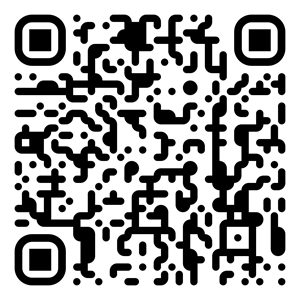Help and Support
Fraud Aware
NEVER click on a link in a text message, particularly one which suggests that your account is on hold or which asks you to verify your account.
If you are in any doubt, please contact Nenagh Credit Union directly
Contact UsPhishing Emails
Fraudsters sometimes send emails pretending to be from your bank, credit card company or another company you trust, usually asking you to click on a link or open an attachment. The emails may seem genuine and convincing but are designed to trick you into sharing your personal information, such as your username, full PIN or credit card number. They will often make urgent threats and try to scare you into providing your details.
- Check for misspellings or unfamiliar sender addresses
- Unexpected emails which claim to come from a financial institution
- Urgent requests and threats
- Claims that your account has been compromised
- Requests to "Open an Attachment" or "Click a Link"
Be suspicious of unsolicited emails. Listen to your instincts - if something doesn’t feel right then stop and question it.
If you are suspicious:
- Call the sender, if possible, to verify they sent the email, using a trusted number or visit their website by typing the address directly into your browser. Phone numbers provided in the email could be fake.
- Do not reply to the email, fill out any forms or follow any of the instructions specified.
- Do not click on any links as they may try to direct you to fake websites.
- Do not open attachments as they may infect your computer with malicious software.
Consider setting up different email addresses for different purposes; such as one for your bank / Credit Union to contact you on, another for family and friends and another for social media accounts.
- Click on or open suspicious links and attachments.
- Respond to unsolicited emails.
- Share your banking details or other personal information if requested via email.
- Send you an email with a link directly to the login page of our online channels.
- Send you an email with a direct link to your latest e-Statement.
- Ask you to click a link in an email with an urgent warning about suspicious activity on your account.
- Ask you to transfer money out of your account to protect yourself from fraud.
- Ask you to share you full online banking login details.
SMISHING TEXTS
Fraudsters may send texts pretending to be from Credit Union Plus. They target mobile users by sending texts with links to fraudulent websites to trick you into providing your online banking details or card details. CREDIT Union Plus will never send you a text with a link to a site that asks you for your full online login details or one-time passcodes.
- Text messages claiming to be from your bank, asking you to confirm financial or personal information.
- Often they claim that urgent action is needed or there will be negative consequences.
- They may ask you to click on a link directing you to a website, or to provide a number to call in order to "verify" or "update" your personal current account
- Do not respond unless you are entirely satisfied that the text is genuine. If you are not sure, we can check it for you.
- Do not use a phone number provided in the text which could be fake.
- Do not click on any links.
- Delete the text.
- If you have clicked on a suspicious link, call us as soon as possible.

VISHING CALLS
Be vigilant if you receive a phone call out of the blue from someone claiming to be from your bank, credit card company or another company you trust. They may claim that your account has been compromised and ask you for your bank card or bank account details.
Credit Union will never call and ask you for your full Online Login Details or one-time passcodes that they’ve sent to you in a text. They will never ask you to download any software so they can take control of your computer or phone, or to move your money to a “safe” account.
Latest scam involves receiving call form mobile number with a recorded message stating that the caller is from the 'Garda FIU' and that 'suspicious transactions' have taken place on 'your account'. The recorded message requests the person to 'dial 1' to rectify the issue.
- Unexpected calls claiming to be from your bank, credit card company or well-known company that you trust, being asked to confirm your password, full login PIN or bank account number.
- Urgent requests and threats.
- Claims that your account has been compromised or there is something wrong with a payment.
- Requests to transfer money out of your account, for example using a money transfer service.
- The fraudster might tell you the first four digits of your card number and ask you to confirm the rest.
- Being asked if you made a recent transaction at a well-known store, such as a supermarket. The fraudster is only guessing this information to sound more believable.
- Claims that some payments have already been made from your account to a foreign country and that they can ‘stop’ any more going through.
- Pre-recorded messages stating to be from your credit union, bank, Revenue or Garda. Professional bodies will never use pre-recorded messages to advise you of something as serious as suspicious activity on your account.
- Don't give away personal or banking information. No matter what story you are told, if it seems a but odd or out of the blue, don't give away your passwords, personal details or banking details.
- If you receive a suspicious call, hang up and don't call back any number the caller may have given you. Remember: Credit Union will never ask you for your full login PIN or full banking details over the phone.
- If you have accidentally shared your banking information over the phone and you are worried, call us immediately. Fraudsters can stay on the line after you have finished the call, so either use a different phone to report the incident or wait a few mins and then call someone you know first, so that you can be sure the fraudster has disconnected completely.
DOCUSIGN PHISHING SCAM
This particular scam asks users to click on a link in a mail similar to the below examples to review or complete DocuSign documents.

Upon clicking on the link you are taken to a fake Microsoft sign in page. On the fake page you will be asked to input your email credentials, at this stage your account would be compromised. It is important to NOT download the file and delete the email immediately if you receive it.
Most web browsers display the URL of a web page above the page in an address bar. If you are expecting documents via docusign, please check with whoever you are expecting to send it to you that it is indeed from them. It is also strongly advised to check the URL (Web Address) of the site you are providing sign in details to. The fake sign in pages are extremely realistic, giving the exact look and feel of a real Microsoft page, even down to the branding.
- Ensure that the MICROSOFT URL starts with login.microsoftonline.com
- if you are expecting documents via DocuSign, give us a call to ensure that we have sent these out to you.
- Never ever click a link and add your credentials unless you are 100% sure that you know where it came from and what it is for.
International Fraud Awareness Week 2025
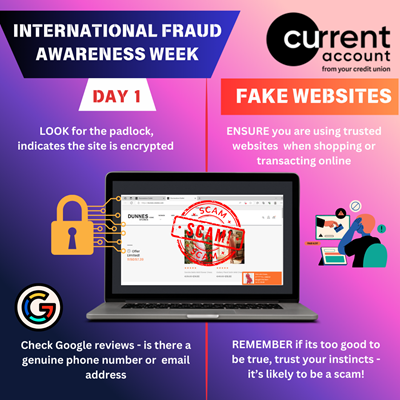
IFAW1: ENSURE you use trusted websites when shopping or transacting online. If the price is too good to be true, trust your instincts, it’s likely to be a scam!
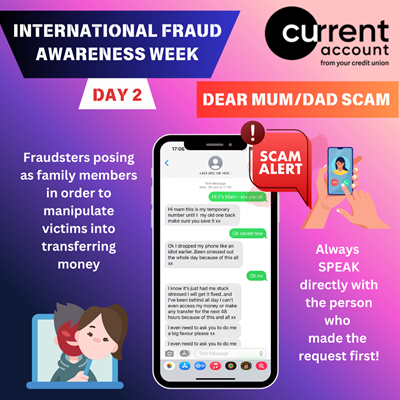
IFAW2: DON’T respond to messages or urgent payment requests from unknown numbers claiming to be a family member. ALWAYS speak directly to who made the request
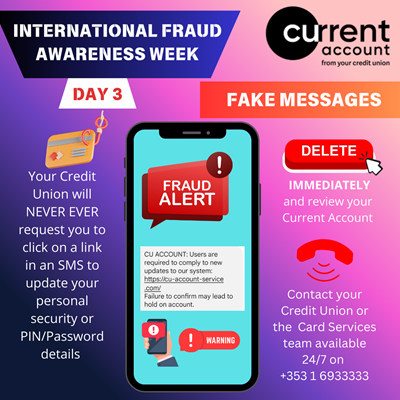
IFAW3: Your Credit Union will NEVER send Texts with links requesting you disclose personal details or share PINs/Passwords for your debit card or online banking
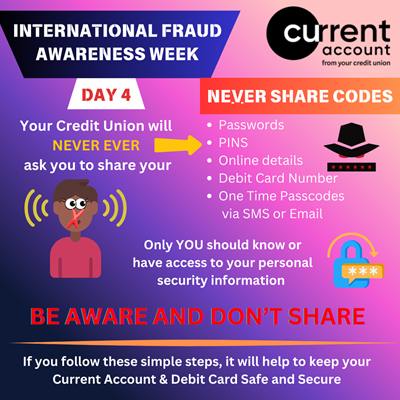
IFAW4: BE AWARE NEVER SHARE SMS/Email Passcodes with ANYONE no matter how insistent they might be. Report this activity to Card Services on 01 6933333
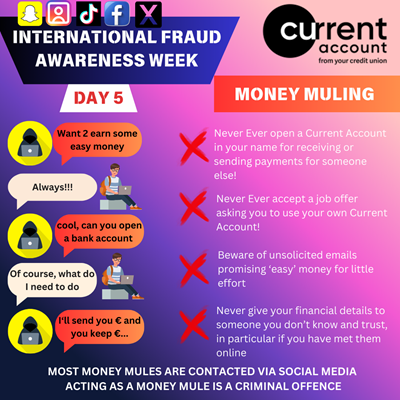
IFAW5: NEVER EVER agree to open a Current Account in your own name for the purpose of receiving incoming or transferring payments on behalf of someone else

IFAW6: NEVER respond to unsolicited calls, emails pop-up ads or social media messages that make claims about investment returns or Crypto currency deals
